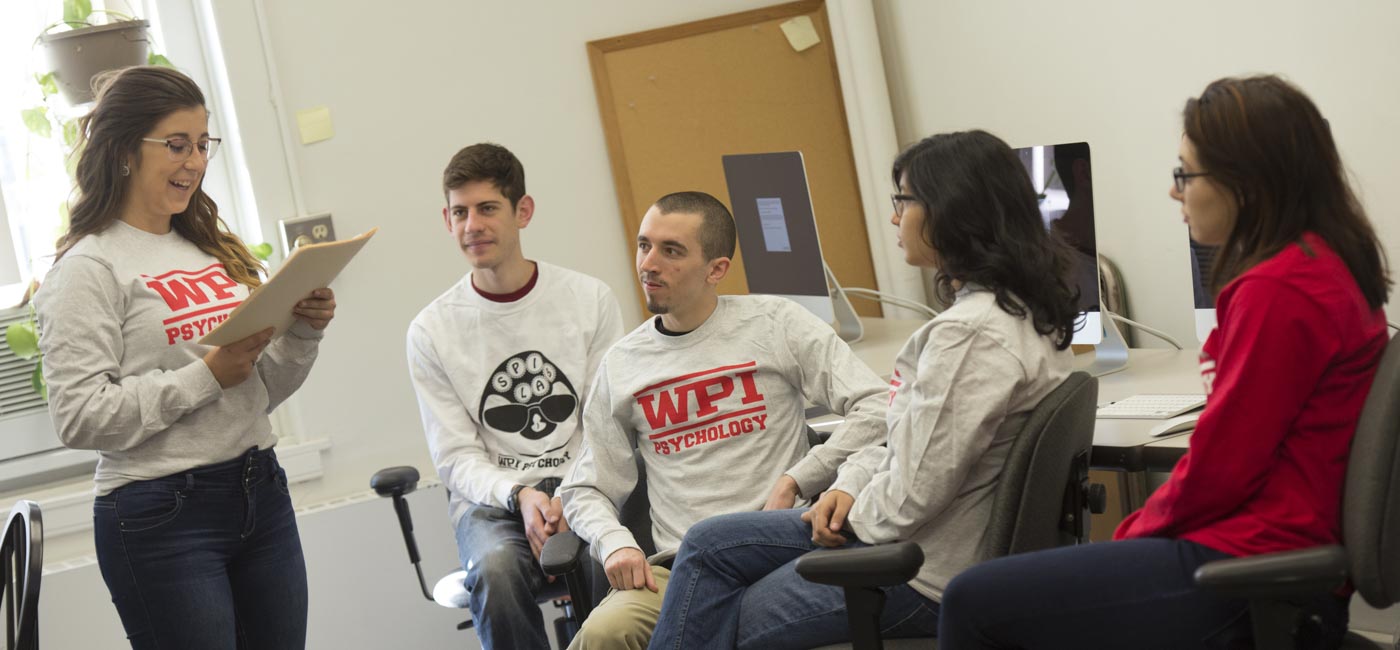Angela Incollingo Rodriguez joined WPI in the fall of 2018 as an assistant professor of psychology and global health. Her research focuses on weight-based stigma—a type of bias or discrimination that affects both men and women. In fact, she has found that just being perceived as fat can impact one’s physical and emotional well-being. In her previous research at UCLA, she observed negative psychological effects in people of normal weight when they were told that their body size and shape disqualified them from a fictitious study on shopping preferences. (The control group was rejected because “the study was full.”)
She also has had subjects take a walk in a fat suit. They reported feelings of anger, anxiety, and depressed mood. When offered snacks, they consumed significantly greater quantities of high-calorie food than control subjects—which suggests that “fat shaming” backfires, and may even lead to obesity.
At WPI Rodriquez is pioneering research on weight stigma in pregnant and postpartum women. The negative health impacts can include increased weight gain, longer retention of “baby fat,” and increased incidence of depressive symptoms. She shared some insights on her work with WPI Journal.
What drew you to this research?
I began researching dieting behavior because I encountered so many people around me trying to diet. What I saw, time and time again, is that successful dieting is really hard, and keeping the weight off usually doesn’t happen. And it turns out that a lot of dieting behaviors aren’t necessarily healthy for us. That made me wonder, why are people still so desperate to lose weight? This is what turned me toward investigating weight stigma, because society is extremely harsh toward individuals who are seen as heavy, even when weight gain happens naturally during pregnancy.
What’s the focus of WPI’s SEED Lab?
My specific interests lie in stigma, eating behavior, and endocrinology dynamic, which I study in various combinations. My main goal in the Stigma, Eating, and Endocrinology Dynamics (SEED) Lab is to understand health at the level of the whole person—integrating psychology with physiology with social factors. I plan to continue investigating weight stigma, especially in the context of pregnancy and through looking at psychological and physiological stress processes. I plan to continue investigating how social and psychological factors—not just how hungry we feel—influence our eating behavior.
You speak of weight-based stigma as a social justice issue, comparable to racial prejudice—can you elaborate on that?
We see so many horrible instances of weight stigma in everyday life, and there is almost no policy level protection for the weight domain like there is for other domains. If comparable comments were to be made about race or gender or sexual orientation, they’d be seen as totally unacceptable. Yet, weight stigma is often seen as “funny.”
One of your studies showed that spending time in a fat suit actually increased the wearer’s anti-fat attitudes. What would it take to effect change?
In general, I think we need more realistic and accepting representation of heavy individuals in the media. We also need policy-level protection for the weight domain (basically, it should be illegal to discriminate against people based on their weight just as it is illegal to discriminate against them based on their race); for schools and communities to have zero tolerance for weight-based bullying; and for the healthcare domain in particular to be very sensitive in how heavy patients are treated, even when weight is relevant to the conversation. This type of message needs to keep coming from people we look up to and admire. There are some celebrities who are promoting size acceptance and shifting what we see as the standard of beauty. Some stores are starting to use heavier models in their ads to normalize heavier bodies, and there are songs like “All About That Bass” that have a positive message about weight. There are also a lot of really fantastic researchers out there who are pursuing this topic, people who are my personal role models.



